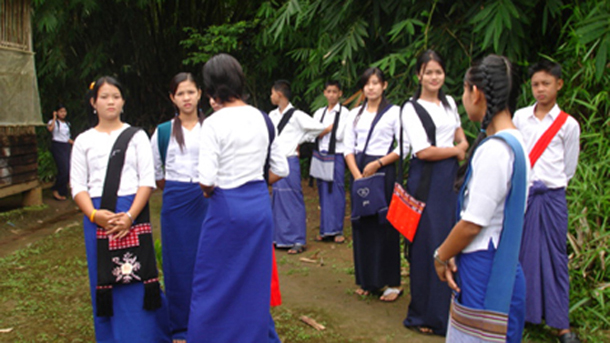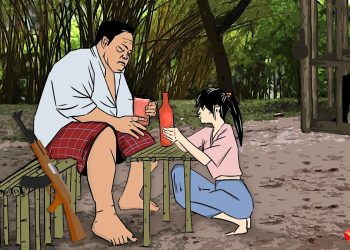RANGOON — Mon State’s Parliament is likely to pass a bill next month that would put teaching of the Mon language into government schools for the first time in more than 50 years, regional lawmakers said.
Local education authorities in Mon State hosted a meeting with different political parties at the Moulmein assembly on Saturday and it was widely agreed that Mon should be taught in government schools in the next academic year, which begins in July.
Nai San Tin, a member of the Mon State Parliament from the All Mon Regions Democracy Party, told The Irrawaddy on Monday that a bill proposing the teaching of the state’s mother tongue would go before the Parliament when a new session begins on April 8.
“We have sought advice from different leaders and have agreed to have the Mon language taught at the government schools,” he said. “This is a pre-discussion before Parliament restarts. We have drafted this bill already, and I will propose it at Parliament.”
“Even the Parliament chairman supports this issue and the draft bill will likely be approved,” he added.
Like in all of Burma’s ethnic regions, government schools in Mon State teach only Burmese, and many Mon children cannot read and write in their native language. Fearing that their language, and with it a large part of their culture, will die out, Mon leaders have for decades demanded Mon teaching in government schools.
Under the proposed bill, Mon would be taught for one hour each day from primary school to Grade 4—from about 5 to 10 years old. The state education department would be responsible for hiring Mon-speaking teachers.
It would also allow ethnic Pa-O and Karen people living in Mon State to study their own languages at school.
Aung Naing Oo, another state MP said, “This is going to be an achievement from our effort.
“All the Mon should be happy for this, even though we will have many challenges.”
Under the democratically elected U Nu government of the 1950s, all schools in Burma’s ethnic areas were permitted to teach native languages, but the military regimes that ruled the country from 1962 enforced monolingual education in all state schools.
As a result, in Mon State, as in other parts of the country, only schools run by ethnic rebel administrations have taught the local language.
The New Mon State Party, an armed group that has a ceasefire agreement with the Burma government but still controls parts of the state, has since 1972 run its own schools under its Mon National Education Department. It runs 156 schools, employing 800 teachers and serving 17,000 students.
Amid political reforms initiated after President Thein Sein came to power in 2011, ethnic lawmakers have made requests for mother-tongue teaching to be reinstated. Since 2012, teaching ethnic languages has been permitted, but only outside of school hours, and without any state funding.
Mi Myint Than, an ethnic Mon lawmaker in the Lower House in Naypyidaw, said that the Mon State chief minister, Ohn Myint, told her that he agreed with the proposal.
“We met him [Ohn Myint] in September and he told us that he agreed to have Mon language at the government schools. He even told us that every chief minister of Mon State should be an ethnic Mon,” said Mi Myint Than.
By allowing Mon teaching at schools, Mi Myint Than said, the language will survive in the young generation.
“This will be a bridge in the future for our all ethnic Mon children to study Mon,” she said. “They will be able to read and write very well in the future if they can study their mother tongue.”

















